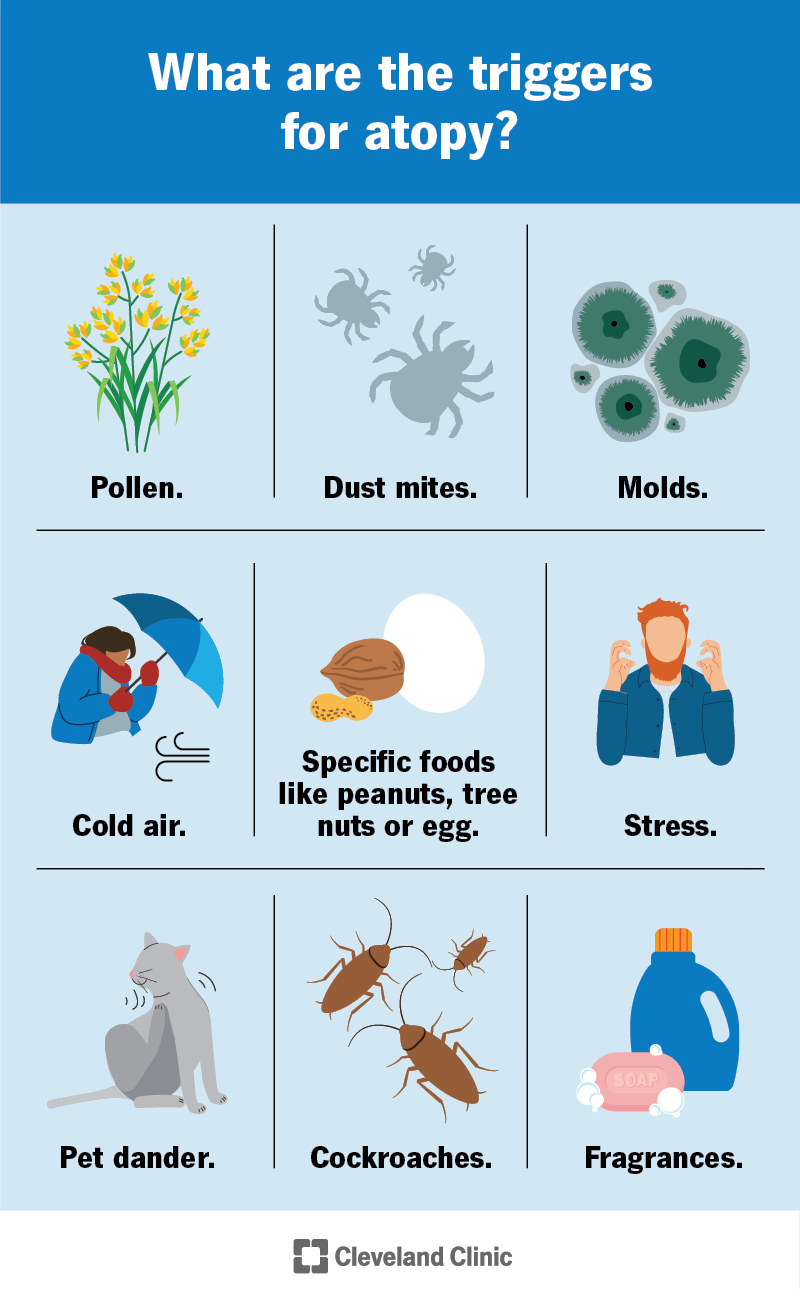Atopy is a group of allergic conditions that people often have together. Atopic diseases include asthma, allergies and eczema. They’re caused by IgE antibodies, which overreact to things they shouldn’t, like pollen or foods, causing symptoms of allergies, a rash or airway swelling. Treatments include corticosteroids, antihistamines and inhalers.
Advertisement
Cleveland Clinic is a non-profit academic medical center. Advertising on our site helps support our mission. We do not endorse non-Cleveland Clinic products or services. Policy

Image content: This image is available to view online.
View image online (https://my.clevelandclinic.org/-/scassets/images/org/health/articles/atopy)
Atopy is a tendency to develop various types of allergic conditions. Atopy means “out of place,” so atopic conditions are your body’s overreaction to something it shouldn’t react to. It causes your immune system to respond to environmental triggers (like pollen or dust mites) with asthma, skin rashes and allergies.
Advertisement
Cleveland Clinic is a non-profit academic medical center. Advertising on our site helps support our mission. We do not endorse non-Cleveland Clinic products or services. Policy
People with atopy often have more than one of type of atopic condition together. You can think of it like the fact that you might be more likely to wear a hat and a coat if you’re also wearing gloves — the same condition (cold weather) increases the chances that you’ll be wearing more than one type of warm accessory.
Atopic conditions include:
Atopy is a bit like having allergic reactions that affect different parts of your body. For instance, allergic rhinitis — what people often think of as “allergies” — is one type of atopic reaction, but it’s not the only one.
The same things that cause allergies — your body overreacting to environmental triggers — can trigger other atopic conditions. But they can also be triggered by nonallergic causes, like cold air and stress.
Symptoms of atopic conditions include:
Immunoglobulin E (IgE) causes the allergic conditions associated with atopy. IgE is a type of antibody that’s supposed to help protect your body from harmful pathogens (germs). But IgE antibodies sometimes mistake non-harmful allergens or other substances for harmful ones. This can cause airway swelling, rashes, a runny nose and other symptoms.
Advertisement
The biggest risk factor for atopy is having other close family members — like a biological parent or sibling — who have atopic conditions. Experts think the tendency to have allergic conditions is inherited through your genes.
Your healthcare provider may not directly diagnose atopy, but they can diagnose its related conditions. Depending on your symptoms, they might perform or order these tests:
You can’t cure the root cause of atopy. But treatments for atopic conditions, like allergies, asthma and eczema, include:
Atopy can’t be prevented, but you can try to avoid triggers that cause atopic conditions. You can also take an antihistamine beforehand if you can’t avoid a trigger (like when you’ll be around a friend’s pet or during allergy season).
Triggers for atopic reactions might include:
Most people with atopy can manage their conditions by avoiding triggers, taking preventive measures and treating reactions as soon as they start. Some ways to manage atopic conditions include:
Talk to your healthcare provider if you have symptoms of atopic conditions like allergies, asthma or frequent skin rashes. They can help sort out what’s causing your symptoms and determine the best treatment. They may need to refer you to an allergist for the best care.
Go to an emergency room or call 911 if you have symptoms of a severe allergic reaction, including:
Advertisement
If you or your child have atopy, you may feel like you’re constantly managing some condition or another. You might be overwhelmed with inhalers, allergy meds, bar soap, free-of-everything laundry detergent, lotions and creams. It might take some getting used to, especially if you’re caring for a child with many allergic conditions. But eventually, managing various atopic conditions becomes routine, like showering or brushing your teeth.
Talk to your provider about any concerns you have. They can help you sort through your options to prevent reactions and manage medications.
Advertisement

Sign up for our Health Essentials emails for expert guidance on nutrition, fitness, sleep, skin care and more.
Learn more about the Health Library and our editorial process.
Cleveland Clinic’s health articles are based on evidence-backed information and review by medical professionals to ensure accuracy, reliability and up-to-date clinical standards.
Cleveland Clinic’s health articles are based on evidence-backed information and review by medical professionals to ensure accuracy, reliability and up-to-date clinical standards.
Allergies can wreak havoc on your life. At Cleveland Clinic, our team of experts can help create a treatment plan that’ll help you breathe easier.
